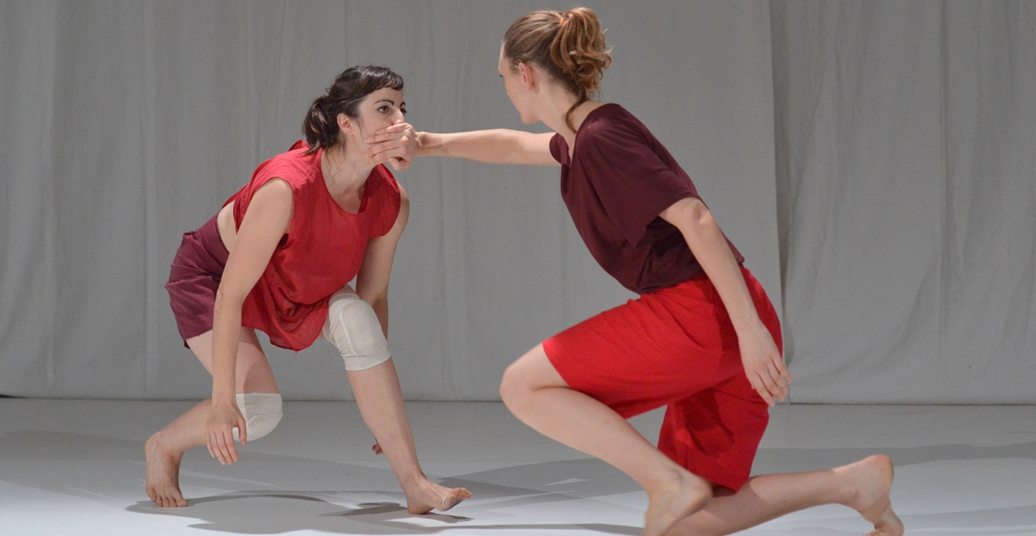Opening Tanztage Berlin 2019, Mirjam Gurtner’s “Skinned” places improvisation within a strictly delineated frame to create a contradictory, challenging work which belies any cohesive interpretation. Combining intuition and artifice, “Skinned” sets itself a difficult task, yet a generosity at its core entices us along for the journey.
As we sit together in a semicircle on the floor, waiting for “Skinned” to start, the stark lighting allows me to take a good look at both my fellow audience members and the four, smiling performers dotted amongst us, conspicuous in their cropped, maroon costumes. The boundaries of the brightly lit room remain resolutely visible throughout, such that the work seems to exist as a self-contained cosmos, a temporary happening, untethered to the outside world.
The piece starts almost without me noticing it. Two of the performers enter the space between us and, leaning against each other, slowly sink to the floor. As they move, the sounds of their breath and the scraping of their feet across the floor are picked up by slender microphones hanging like pendants from the ceiling, and transformed into a soundscape. Reacting to each other with subtle, abstract movements, it seems as though the dancers are about to lead me along a path I’m familiar with from other pieces of instant composition; as they follow their obscure games and hidden codes, I will either attempt to decode them, or enjoy the freedom of interpretation that their ambiguity allows me. It quickly becomes clear, however, that the performers’ tasks require little parsing. As all four take to the central space, they start to clamp their hands over each other’s mouths, or form suffocating heaps of bodies until their breath runs out and someone withdraws, panting. A dancer repeatedly plunges, face-first, towards the floor, only to be saved at the last moment when a body hurls itself underneath them and breaks their fall. They grab noisily at each other’s flesh. It puckers forcefully, skin sliding on sweaty skin. A technician, diligently following the performers with a microphone, records and amplifies the resulting sounds.
While the dancers’ tasks produce viscerally effective results, they feel so clearly defined and studied that they neutralise any true sense of risk. And despite violent bursts of energy, I can never shake myself free from the sense that the performance is controlled by a meticulous external orchestrator – each momentary loss of control takes place in a carefully controlled environment. As a result, my attention switches away from the climactic moments of risk and towards their unavoidable echoes in the form of a stream of constantly escaping micro-expressions from the dancers; the rising and sinking shoulders of a breathless dancer watching their colleagues; the cryptic look on the face of another performer as they observe a body they have just pushed to exhaustion.
We, the audience,are also laid bare. We serve as instruments, obstacles, and resting places forthe dancers. We are invited to look at each other, and to be looked at in turn.The floodlights give both the performers and the audience nowhere to hide. Itis perhaps, ultimately, this exposure that “Skinned” concerns itself with, even more so than with physical vulnerability.
At certain points during the performance, the lights dim and become more conventionally theatrical. Our attention is drawn in closer, allowing us, briefly, to forget the other intently watching faces. The movements on stage become hesitant and indecipherable. A curious intimacy begins to emerge. Is a darker, more uncertain voice attempting to break through? Are cracks in the dancers’ amiability beginning to show? Interactions evolve from games into complex negotiations, as though the piece is seeking to reach beyond its self-prescribed borders, and I begin to perceive the ‘loss of safety’ described in the programme text. Suddenly, the lights go back up, and two dancers start to play catch with a third, passing her between them by her head, as though it were a beach ball. The games begin again in earnest, seemingly unaffected, and I’m left doubting the significance I attributed to those more muted moments.




